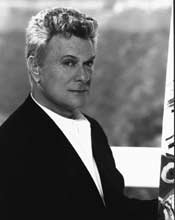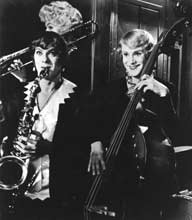Tuesday, September 14, 2004
Copyright © Las Vegas Review-Journal
SEEN IT ALL: Sweet Smell
of Success
After ups and downs as
an actor, Tony Curtis focuses his energy on art
By KEN WHITE
REVIEW-JOURNAL

Tony Curtis will receive the Nevada Entertainer-Artist Hall of
Fame Award tonight.

Among the classic films of Tony Curtis is Billy Wilder's 1959
comedy "Some Like It Hot," with Jack Lemmon, right.
|
Tony Curtis bent down on his 79-year-old
knees holding an imaginary shoeshine rag between his outstretched
hands.
He's back in time to the 1930s when he was
Bernie Schwartz, the young Jewish son of a Hungarian tailor in the
Bronx, N.Y.
The Schwartzes didn't have much money. One
day, Bernie's father built him a shoeshine box and gave him a rag
and some polish and said: "Go shine some shoes. Make some money
for yourself."
"So I schlepped all over Manhattan and shined
shoes for a nickel or a dime," Curtis recalled, kneeling in the
living room of his home that overlooks a golf course and the Las
Vegas Valley.
"All I remember as a kid was here," he said,
leaning over, looking down at the floor. "That had an effect on
me. With my head low and doing my job, I felt like nobody. You
were nothing but an incident on the street. It made me slower in
other areas. As I got a little bit older, that shoeshine boy never
left me. I always felt that to please you, I'd have to get down
and stroke your shoes."
For a man who didn't want to catch anybody's
eye "because if I did I would see hostility in the eyes of a lot
of these men looking down on this kid shining shoes," Curtis did
more than overcome. He became one of the top actors of the 1950s,
with roles in the classic Billy Wilder film "Some Like It Hot" and
other classics, including "Sweet Smell of Success," the
Oscar-nominated "The Defiant Ones" and Stanley Kubrick's
"Spartacus."
He will receive the Nevada Entertainer-Artist
Hall of Fame Award tonight at the University of Nevada, Las Vegas,
for his achievements in acting and fine arts.
Curtis said he grew up with the stigma of
being a Jewish boy living in what can only be called anti-Semitic
times.
He also overcame a lack of education, having
never attended high school.
"I never had an education, other than what I
picked up all over the place," Curtis said. "I learned a little
reading, writing and arithmetic. That's just the way it was. I
would have loved to have lived in a small town and gone to a good
school and had parents who appreciated me. My mother abused me a
lot, slapped me around. My father was a depressed man, always
sewing. I had nobody to look up to. These were the enigmas, the
holes in the world for me in the '30s and '40s."
He enlisted in the Navy at 17, and counts it
as an important experience in his life. "I saw the world. Up to
that point, what did I see? The subway, people's shoes under me,
jumping on the back of trolley cars, stealing stuff from 5- and
10-cent stores. Climbing on elevator trains, physically trying on
anything and everything, trying not to get hurt. I was a good
athlete. In a way, that prepared me for a movie career."
Curtis was seen by a Universal Studio talent
scout in a production of the play "Golden Boy." He was signed to a
seven-year contract, and his name was changed to Anthony Curtis.
He made his first movie in 1948, but had some difficulty adjusting
to the camera and other actors. He had the handsome movie-star
looks -- it was the inability to make eye contact that gave him
trouble.
"The first couple of directors asked: `What's
he looking at? Hey kid, look at me.' My eyes would wander. I
didn't want to make eye contact. But I got over that in a hurry. I
saw what they were getting at. I started to like that work. I was
able to be anything I wanted. If I played a gangster in a movie, I
was a (expletive) gangster. If I was a lover, I was a lover. There
was nothing left of the girl when I got done."
His Bronx accent also created problems. It's
still there in his voice, but in the movies he managed to modify
it enough, with the help of a speech instructor, so that it didn't
matter.
"Oh, sure you knew it was me (on screen). But
all of a sudden something happened, you're not sitting there
watching Tony all through the movie. The movie had a way of
enveloping you, and the next thing you know you're watching images
of (seemingly real) people."
After a string of so-so movies in the early
1950s, Curtis got himself loaned out of Universal Studio for more
ambitious roles.
"I was privileged that I got certain movies
to make. For `Trapeze,' there was no guy better looking or in
better shape to play the acrobat. I loved it. I was perfect for
it. `Some Like It Hot,' `Sweet Smell of Success,' `The Boston
Strangler' -- each one of these people, I brought some little
element that made it stand out."
He enjoyed the fame and the women that came
with it. And he liked putting on reporters, especially female
ones, with outrageous quotes such as: "What's the secret to a long
and happy life? Young women's saliva!"
But Curtis said he began to sour on people
during the period of his greatest success in the late 1950s.
"I was marrying a lot," he said. His list of
wives includes Janet Leigh -- who is the mother of his actress
daughters Jamie Lee Curtis and Kelly Curtis -- Christine Kaufmann,
Leslie Allen, Lisa Deutsch and current wife Jill Vandenberg.
And he did several insignificant movies such
as "40 Pounds of Trouble," "Goodbye Charlie," "Sex and the Single
Girl," "The Great Race," "Boeing Boeing" with Jerry Lewis, "Don't
Make Waves" and "Not With My Wife You Don't!"
During that period, Curtis became a painter
and "partied a lot," he said.
But the urge to do better work returned in
1968 with the chance to play Albert DeSalvo in "The Boston
Strangler."
His preparation for the role included
thinking and acting like a man devoid of emotion.
"The only way I was able to play him was to
divorce myself from anything and everything. Everything I saw was
for the first time. I didn't make any recognition of anything. I
wasn't interested in anything. I paid no attention to anything."
Some advice from Laurence Olivier also
helped.
"We were talking about acting, and I said,
`Larry, how do you approach a part?' He said: `Clothes make the
man. Dress the way you want to look. Dress the character. That
will tell you what to do.' He was absolutely right.
"I built a different nose for myself, I wore
brown contact lenses, I dyed my hair darker. I wore 25-pound
weights around my waist, I wore heavy boots, which slowed me down
and made me walk differently."
It was one of his best performances.
But the good roles didn't continue. Curtis,
seemingly more interested in art than acting, took roles in "The
Persuaders" and "Vega$" TV shows, and continued his
self-education.
These days, Curtis said, he's not that
interested in acting. "It just eats up too much time and it just
ends up as another movie. I've made 140 of them," counting
television episodes, which he considers short films.
He has concentrated more on art, constructing
his art boxes and painting and sketching in a studio behind his
house.
"I've never gotten over it (showing his art).
I'm always so pleased when I show something and people say, `You
did that?'
"But the ultimate experience is the doing of
it."
|
![]()